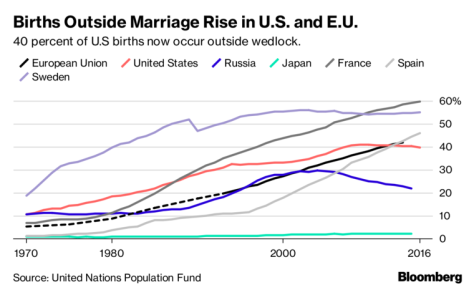The War Against Sexual Order Has Young Men in Full Retreat
Beware of the sperm-jacker, warns Dean Cardell on the men’s website AskMen.com. She’s “all about getting pregnant and not about being into you.” He identifies five types: (1) the Lesbian, who may at least do you the courtesy of asking for your contribution directly (the others go after it by stealth); (2) the Girl Running Out of Time and (3) the Trapster, both of whom are looking for a “just-add-water” family; (4) Miss Lonely, who needs someone to cling to; and (5) the angry Miss Independent, who nevertheless wants a little one to fill a void. All sperm-jackers have one thing in common: they need something they can only get from a man. Most any man will do.
Cardell’s post has all the class of a Bill Maher rerun, but it does expose a very serious threat to men, as psychologist and men’s advocate Helen Smith, Ph.D., documents in Men on Strike. Take the following cases of nonconsensual insemination: Nathaniel from California, age 15, had sex with 34-year-old Ricci, which, due to his age, was legally considered non-consensual. Emile from Louisiana was visiting his parents in the hospital when a nurse offered him oral sex if he wore a condom, which she conveniently offered to dispose of for him afterward. S. F. from Alabama passed out drunk at the home of a female friend and awoke undressed the following morning. In all three cases, including the one involving the minor, a woman got sperm and, nine months later, a child, and the man got ordered by a court of law to pay support for eighteen years.
Less devious, but similarly amiss, are those cases in which a man, having been betrayed by his wife or girlfriend, was nevertheless held financially responsible for a child genetically proven to be another man’s offspring. While not as sensational as sperm-jacking, it is another form of paternity extortion.
The Assault on Men
Paternity fraud is only one aspect of the larger, decades-long, feminist-incited assault on men to which Smith is attempting to draw public attention. While the feminist movement may originally have been about equal respect for both sexes, what it has morphed into, she argues, is a female privilege. From rape laws that empower women but not the men they may falsely accuse, to divorce laws tilted in favor of the wife, to the feminization of the U.S. education system, men have become the sex under the gun, while women enjoy the status of a protected class.
But unlike their mothers or grandmothers, men today are not taking to the streets burning their undergarments and shrieking demands (thank God). They’re doing just the opposite, which is far worse. They’re going on strike. The strike zones are manifold:
Higher Education. In addition to the enrollment imbalance, which is approaching a 60/40 ratio of women to men, college has become, in the words of one professor, “a hostile working environment [in which] males increasingly feel emasculated.” Smith quotes a student named John, who had this to say about his college experience: “I had already been cautious around women, having grown up with Tawana Brawley in my backyard and daily stories of sexual harassment; I played it safe and passive every time. But it doesn’t matter. The only way not to lose is to not play. So I’m out.”
Work, including community involvement. With higher female graduation rates and salaries, men today are falling behind their fathers economically and professionally. Consequently, their efforts to prove themselves worthy mates through hard work and higher earnings don’t win female attention the way they used to. Discouraged, too many retreat to a man cave, and inertia sets in from there.
Marriage. Marriage rates are down, and honest men opting out will tell you why. Smith cites a Rutgers University study of single heterosexual men which turned up the top reasons they hadn’t married. They can get sex and the companionship of cohabitation without marriage more easily than in times past, and they don’t want to open themselves up to the risk of divorce and financial loss. It really isn’t that complicated a decision. In fact, it’s often not an actual decision at all. It just happens.
Reasonable Reactions
But Smith cautions against any superficial conclusions that attribute all this to male immaturity, laziness, or plain sexual economics. While those things may figure in, the man-child label simply doesn’t stick to the men she actually hears from. On the contrary, she says men are “acting rationally in response to the lack of incentives today’s society offers them to be responsible fathers, husbands, and providers.” It isn’t an organized, or even a declared strike. It’s more of a reluctant retreat. Why should they do otherwise? Chris, a thirty-something single man, captured it: “There is nothing in it for me, no incentive and no reason.”
Ironically, feminist demands have had the effect of shrinking the pool of appealing marriage prospects. And scheming women have descended to the grossly abusive and socially malignant shenanigans of sperm-jacking and paternity seizure. Clearly, something has gone terribly wrong.
The Real Conflict
Smith offers men and their supporters two strategies for fighting back (her words). One is to “go, Galt,” a metaphor—taken from the 1957 Ayn Rand classic Atlas Shrugged—for withdrawing one’s labor from the marketplace to keep from being exploited. This is what some men are doing, as the trends indicate. The other strategy amounts to a counteroffensive deploying the same power plays the feminists have used: forming alliances and support groups, lobbying for legislative change, and, short of that, mocking or intimidating opponents.
Smith has written a very important book, and certainly, there’s a place for some of her suggestions. But there’s a shortcoming in both of her strategies in that they are founded on the premise that the main “war” is the one between the sexes. Going Galt is effectively capitulating, which is neither noble nor masculine while deploying counterstrikes is fighting women directly, which is worse. But the combatants in this “war” aren’t so much primary warriors as they are casualties. They—and the children caught in the fray—are collateral damage in a larger conflict: the war on basic sexual order.
Consulting the Past
There is a better way to win. In his article about sperm-jackers, Cardell advises, “Be prepared to draw the line regarding your involvement and your connection to her crazy a$$.” He’s warning men of the potential consequences of (pardon me) wanton ejaculation and advising them to set boundaries and take control of themselves for their own benefit. He doesn’t even mention the potential effects for her or for their potential offspring, which are incalculably profound. Before you get involved, he says, draw the lines. Aside from the crass wording, it’s decent advice.
Sometimes, as former police officer and author J. Warner Wallace has noted, the road to the future we want passes through the past we’ve forgotten. Wallace was writing about the importance of fathers with respect to crime prevention, but the same idea applies to the context in which a man becomes a father.
Once upon a time, there was a custom for drawing the lines in this area of life. Often marked by a special ceremony, it involved promises—promises so solemn they were made before God and witnesses. When kept, they assured the woman of a father for her children and gave the man a companion and progeny to work for and invest in. The result created the best guard against exploitation, both for them and for their offspring. They could cooperate rather than compete, exalt rather than exploit. For battle-weary men and women, there’s no better time than the present to consult the wisdom of the past.
Terrell Clemmons is a freelance writer and blogger on apologetics and matters of faith.
This article was originally published at salvomag.com: http://bit.ly/2OgDnpY








